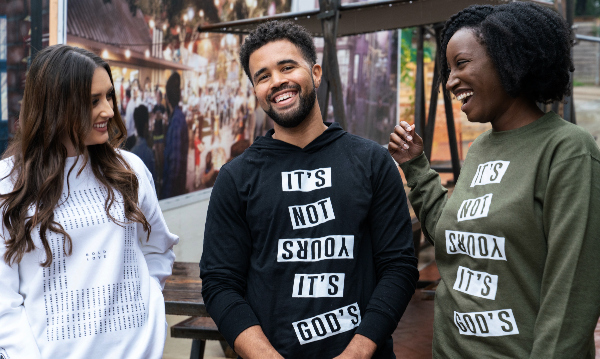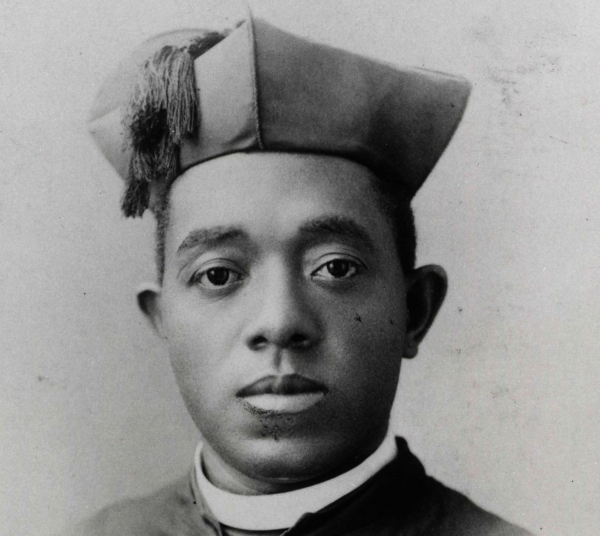Perception vs. Reality
“Your job must be difficult, because, you know, most of the Catholic Church in the United States is white.”
I flinched as my friend’s all-too-familiar comment travelled across the table at our DC-area coffee shop. As a black Catholic who is passionate about truth, justice, and my faith, my heart sank.
I told my friend that his perceptions were incorrect and that depending upon where a person lives, the church in the U.S. can appear much less diverse than it is in reality. He had failed to consider, or was unaware of, the growing number of Hispanics, Asians and Pacific Islanders, Native Americans, Africans from many African nations, African Americans, Haitians, and Chaldean Americans in the Catholic Church in the United States. But from where did his perceptions come? Perhaps his hometown, where his faith community was almost exclusively made up of people of European American ancestry. Nonetheless, I couldn’t help but wonder, were his perceptions formed by the often-monochromatic face of the New Evangelization?
 The US Bishops, in a recent pastoral letter on racism called “Open Wide Our Hearts: The Enduring Call to Love,” have stated that “although our nation has moved forward in a number of ways against racial discrimination, we have lost ground in others” (9). The toxic effect of racism is felt on a number of levels, including “the continued erosion of the sanctity of life” (10). Thus, the Bishops emphatically call “all the faithful to endeavor to be missionary disciples carrying forth the message of fraternal charity and human dignity…by developing and supporting programs that help repair the damages caused by racial discrimination” (27). The challenge has been clearly presented! If the New Evangelization is to advance in a way that is faithful to the Gospel, people from all ethnic backgrounds must be allowed to proclaim the faith and be invited into the mystery of faith.
The US Bishops, in a recent pastoral letter on racism called “Open Wide Our Hearts: The Enduring Call to Love,” have stated that “although our nation has moved forward in a number of ways against racial discrimination, we have lost ground in others” (9). The toxic effect of racism is felt on a number of levels, including “the continued erosion of the sanctity of life” (10). Thus, the Bishops emphatically call “all the faithful to endeavor to be missionary disciples carrying forth the message of fraternal charity and human dignity…by developing and supporting programs that help repair the damages caused by racial discrimination” (27). The challenge has been clearly presented! If the New Evangelization is to advance in a way that is faithful to the Gospel, people from all ethnic backgrounds must be allowed to proclaim the faith and be invited into the mystery of faith.
Social Media and “The Other”
We live in a time when technology allows us to be strengthened week to week by a never-ending stream of Catholic media content. Whether it is YouTube, podcasts, or the latest from your favorite online media source, we can consume Catholic thought 24/7! Efforts in Catholic social media are overwhelmingly positive and, in many cases, provide the catalysts that change and save lives! These are our lifelines when in the process of trying to find Jesus and understand the faith. These are our lifelines when trying not to lose our faith and rediscover Jesus. But how is our perception of the Catholic Church in the U.S. impacted when those carrying the messages are largely from a single ethnic group?
Consider also, secular media’s negative images and stereotypes of people of color that many of us grew up seeing on screens big and small. Such repeated negative images in secular media and such a lack of positive images in Catholic media can cause subtle beliefs of superiority or inferiority to form. In this way, it becomes easy to associate the true, the good, and the beautiful with those who only come from one particular ethnic background, and the false, the bad, and the ugly with those who come from another.
Generally, negative media images of certain groups of people, often people of color, paired with limited personal exposure to these groups can negatively affect how we relate to individuals from these groups in real life, even if subconsciously. Here an observation from the Bishops’ pastoral letter against racism is helpful. They note that “African Americans have been branded, by individuals, society, and even, at times, by members of the Church, with the message that they are inferior” (14). Yet, the gospel reveals the fullness of all our identities, as sons and daughters of God. The more we cultivate this truth, which will lead to divine intimacy, the more our earthly identities can be healed from the damage society causes through its brokenness and history of oppressing others.

The New Evangelization must be proclaimed through and to people from every ethnic background. Representation on a national stage from exclusively European American people, does not fully represent the kingdom of God, nor does it represent the reality of the Catholic church here on earth. Additionally, it can hinder efforts to evangelize people of color who do not identify as European American. We must overcome the damage that racial prejudices have caused
Them or Us
As a high school student and extrovert theater kid, I thrived on befriending people in every ethnic background at my all girls Catholic school, migrating from table to table during lunch. Why, you might ask, didn’t all my friends just sit together? Well, unfortunately, my high school cafeteria was generally self-segregated by race. The European American blondes somehow often congregated together in one section, the European American brunettes in another section, African American girls in another, and the Chaldean American girls in another. At one point, I was told by one of my friend groups that I would have to pick, “them or us.” I refused to choose and spent the rest of the year having lunch in the library.
Your experiences with race and ethnicity may not have been as stark as mine, but stories like mine are what many students have to draw upon when they come to the melting pot of a college campus. We must consider that for some, experiences with people of different ethnic backgrounds are littered with violence and/or racial prejudice. These ills are still rampant today, and their influence on us can affect our Christian witness in several ways. Subtle long-held preferences seep into the way we approach our lives as Christians. They seep into the way we invite people into our men’s and women’s groups, bible studies, and our lives in general. Our subtle preferences for personality, attractiveness, and levels of athleticism, often lead us to restrict our invitations to others to join our Christian walks toward Christ.
In addition to those preferences, we fear rejection like no generation before. Fear causes us to approach only those we gauge most likely to accept our invitation, fear based on past experiences and societal conditioning. Our past or current experiences may tell us that a person is more or less likely to be Catholic, to join a Rite of Christian Initiation of Adults class, to accept Christianity, to be a good brother or sister in the Lord, to join our bible study, or accompany us to a mass based upon their perceived ethnic background. These are prejudgments that could cause the fullness of Gospel to be selectively and unequally proclaimed.
Such a Time as This
Brothers and Sisters, these fears are real, but let us not give into fear! The Bishops encourage us to combat racism as intentional disciples by “forging authentic relationships” specifically with “those we might regularly try to avoid” (23). By doing so we respond to the Lord’s command in the last chapter of Matthew’s Gospel: “go, therefore and make disciples of all nations, baptizing them in the name of the Father, and of the Son, and of the Holy Spirit.” Contrast the homogenous nature of many of our Christian communities and social circles with the first Pentecost when the disciples began proclaiming the glory of God and power of Christ in the native language of more than a dozen different countries. Further, before his ascension, Jesus promised the disciples that they would be his witnesses to the ends of the earth.
Brothers and sisters, BE NOT AFRAID. You were created for such a time as this! Bring into your prayer time a desire for an awakening in your conscious of the places where you may have picked up subtle ethnicity related biases or beliefs in your own inferiority. Place them before God and ask him to speak new life into these deadened places in your heart. Ask the Lord to help you journey life with people who truly reflect the diversity of the human family. Ask the Lord to put a fire inside of you that burns for all souls. Be honest with yourself and with the Lord about the fears you have. Take courage in the witness of the many American figures like Venerable Fr. Augustus Tolton and St. Katherine Drexel! Let us all become saints, spreading the gospel to people of all nations!

(Credit to CNS/Archdiocese of Chicago)
Though we may have different gifts and challenges, we are more alike that different! We are unified in our deepest, truest desires and the questions that keep us awake at night. As disciples we know that our desires and questions will only be satisfied and answered by the one who is the truth, the truth who is a person, the truth that has a name.
Seek out all the people who ache for the truth like you do! You will find yourself running after Jesus in life, and standing at his throne after death, with people whose diversity could only reflect the infinite creativity of an infinite God.
Open wide your hearts.
